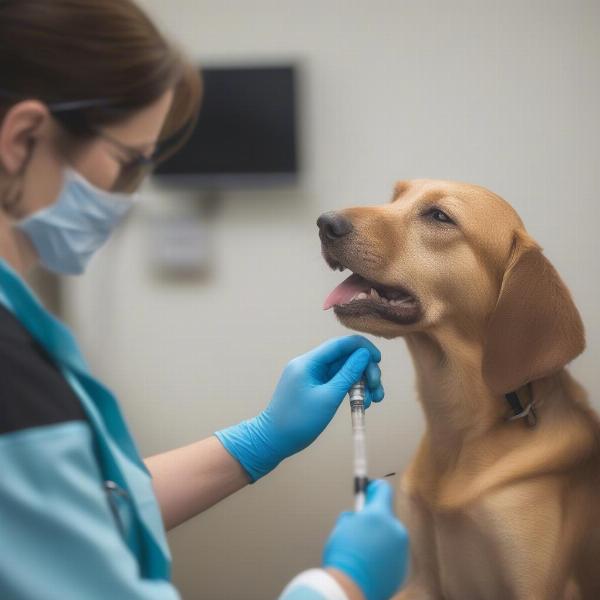Hepatitis in dogs can be a serious concern for pet owners. Understanding the different types, symptoms, diagnosis, and treatment options is crucial for protecting your canine companion. This comprehensive guide will cover everything you need to know about hepatitis and dogs, from prevention to long-term care.
What is Canine Hepatitis?
Canine hepatitis, also known as infectious canine hepatitis (ICH), is a highly contagious viral disease primarily affecting a dog’s liver. It is caused by the canine adenovirus type 1 (CAV-1). While the virus can affect other organs like the kidneys, eyes, and lining of blood vessels, the liver is typically the most severely impacted. Symptoms can range from mild to severe, and in some cases, the disease can be fatal, especially in puppies.
Types of Canine Hepatitis
While ICH is the most common form, it’s important to distinguish it from other liver conditions sometimes referred to as “hepatitis.” These include chronic active hepatitis, which is an ongoing inflammatory liver disease, and other infectious causes of liver inflammation. This guide focuses specifically on ICH caused by CAV-1.
Symptoms of Canine Hepatitis
The symptoms of canine hepatitis in dogs can vary greatly depending on the severity of the infection. Some dogs may show mild signs, while others experience more severe illness. Common symptoms include:
- Fever
- Lethargy
- Loss of appetite
- Vomiting
- Diarrhea
- Abdominal pain
- Jaundice (yellowing of the gums, skin, and whites of the eyes)
- Enlarged tonsils
- Coughing
- Eye discharge
- Increased thirst and urination
In severe cases, neurological symptoms such as seizures and coma can occur. Puppies are particularly vulnerable and can develop a rapidly fatal form of the disease.
Diagnosing Canine Hepatitis
If you suspect your dog has hepatitis, it’s crucial to seek veterinary attention immediately. Your veterinarian will perform a physical examination and run diagnostic tests, including blood work, urine analysis, and possibly imaging like X-rays or ultrasounds to assess the liver and other organs. Specific tests can detect antibodies to CAV-1, confirming the diagnosis.
Treating Canine Hepatitis
Unfortunately, there’s no specific antiviral treatment for canine hepatitis. Treatment focuses on supportive care to manage symptoms and prevent secondary infections. This may include:
- Fluid therapy to correct dehydration
- Medications to control vomiting and diarrhea
- Antibiotics to prevent secondary bacterial infections
- Nutritional support
Preventing Canine Hepatitis
The most effective way to protect your dog from canine hepatitis is through vaccination. The CAV-1 vaccine is typically included in the core puppy vaccination series and is highly effective in preventing the disease. Booster vaccinations are recommended according to your veterinarian’s guidelines. Maintaining good hygiene and avoiding contact with infected dogs can also help reduce the risk of infection.
 Veterinarian administering a canine hepatitis vaccine to a dog.
Veterinarian administering a canine hepatitis vaccine to a dog.
Long-Term Care for Dogs with Hepatitis
Dogs that recover from canine hepatitis may experience long-term liver damage. Regular monitoring of liver function through blood tests is often recommended. A special diet may also be necessary to support liver health.
Conclusion
Canine hepatitis is a serious disease that can have devastating consequences for dogs. Understanding the symptoms, diagnosis, and prevention strategies is crucial for responsible pet ownership. Vaccination remains the most effective way to protect your dog from this potentially fatal illness. If you suspect your dog has hepatitis, seek immediate veterinary care.
FAQ
- How long does canine hepatitis last? The duration of the illness varies, but most dogs recover within a few weeks with proper supportive care.
- Can humans get hepatitis from dogs? No, canine hepatitis is not transmissible to humans.
- Is canine hepatitis contagious to other animals? Yes, it’s highly contagious to other dogs, and some related viruses can infect other canids like foxes and wolves.
- What is the prognosis for dogs with canine hepatitis? The prognosis depends on the severity of the infection. With prompt treatment, many dogs recover fully, but some may experience long-term liver problems.
- How can I prevent my dog from getting canine hepatitis? Vaccination is the most effective preventive measure.
ILM Dog is your trusted source for comprehensive dog care information. We offer expert guidance on everything from breed selection and puppy care to senior dog health and travel tips. Our team of dedicated dog enthusiasts is passionate about providing you with the most accurate and up-to-date information to help you give your furry friend the best possible life. For personalized advice and resources, contact us at [email protected] or +44 20-3965-8624. Visit ILM Dog for more expert tips on dog care.